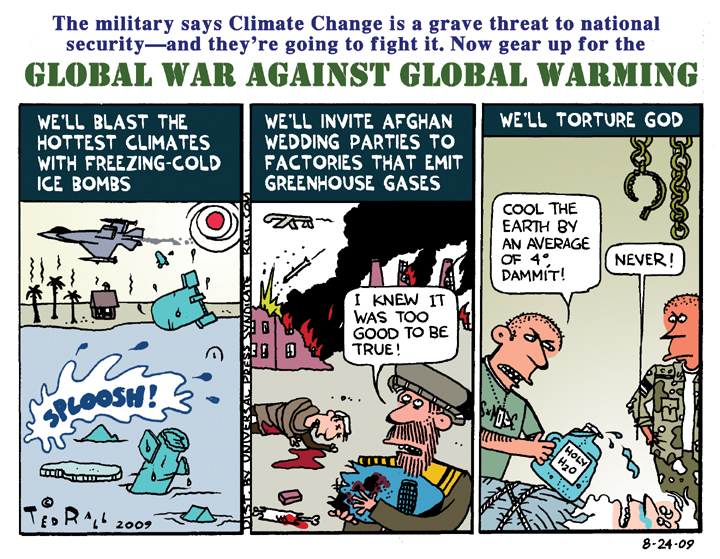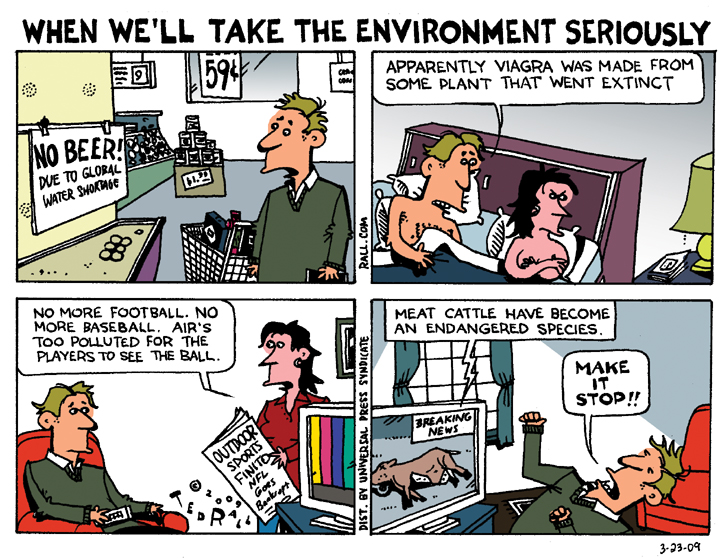I’m worried that people might not understand this. It’s not about crime. It’s about the Gulf of Mexico oil spill, which made me muse about how it would be for garden-variety criminals to be treated like white-collar corporate thugs.
Happy Earth Daze
posted by Susan Stark
This past week has been about the environment, coinciding with Earth Day on the 22nd. I was a little less than enthusiastic.
Unfortunately, like many holidays, this one has been compromised by those who oppose the very spirit the holiday is supposed to represent. Corporations used the event to trot out their “environmentally friendly” junk that people can whip out their credit cards for. And that includes the trotting out of ethanol and other supposedly friendly “biofuels” (never mind that biofuels cause increases in the price of food as arable land is used to grow gas). But the whole point of Earth Day is not to “buy” environmental products.
The whole point of environmentalism is to consume less. That is, to decrease your energy and material footprint on the planet, thus reducing global warming and the overconsumption of natural resources.
In the so-called developed world, especially in the US, this is not always easy to do. But it’s possible. You can start by doing this:
1) To decrease your energy footprint, make it a rule in your household that the last one leaving a room must turn off the lights and other appliances being used.
2) To decrease your energy footprint, install night-lights in the hallways so you can see without having to turn on the over-head lights. Night-lights use less energy.
3) To decrease your energy footprint, unplug ALL appliances in the household when they are not being directly used. All of them. Many appliances, such as a stereo or cable/satellite box, use energy even when not turned on.
4) To decrease your energy footprint, find out if there are any public transportation facilities where you live (train or bus), and use them as much as possible. Even out in the country, there may be a county bus system you can use.
5) To decrease your energy footprint, use a scooter, bicycle, moped, or your own two feet to get around instead of lazily using the car to go to the corner store or anywhere else nearby.
6) If you have a gas-guzzling automobile, go online or check around to see if you can have your vehicle modified so that it uses less gas per mile. Needless to say, this will decrease your energy footprint dramatically.
7) To decrease your energy footprint in the summertime, use a fan instead of air-conditioning. A fan uses less energy than the other. Also, take cool showers instead of hot showers. Not only do cool showers keep you cool, they also use less energy than hot showers. And, if it is REALLY HOT, take a t-shirt, run it under cold water, wring out the excess water, and put it on. This will keep you cool for hours. You can also wet your hair to keep you cool.
8) To decrease your energy footprint in winter, shut down the heat when there will be no one in the house or apartment. If you worry about pipes freezing, see what you can do to prevent this. If you want plants in the household that don’t die without heat, get plants like small cedars or spruce trees or any other type of evergreen plant. When there are people in the house or apartment, bundle up as much as possible and keep the heat on low. To keep cold air outside and warm air inside, put duct tape or weather stripping on the cracks of your windows and on the doors that you don’t use very often.
Reducing Waste:
1) If there is any item in your possession that you have no use for anymore, but can still be used by someone else, do not throw it away. Either give it or sell it to someone you know who wants or needs it, such as a friend, co-worker, family member, or neighbor.
2) There is website you can go to that can help you reduce waste:
http://www.craigslist.org/about/sites.html
At this site, you can post one or more items that you are either selling or giving away. You can also obtain items that others are selling or giving away. Here is another extemely useful website you can use:
At Freecycle, you can give or obtain items, but only for free. Hence the name “Freecycle”.
3) You can do the traditional method of decreasing waste, and that is to give items to your local charitable organizations (Salvation Army, Goodwill, etc.).
4) If you have electronic appliances that no longer work, you can recycle these:
http://www.epa.gov/epaoswer/hazwaste/recycle/ecycling/donate.htm
You can also do a google search on where you take e-waste to in your local area.
5) Finally, when you buy anything, try to buy it used. As much as possible.
6) And most finally, when considering buying an item (like a video game) or a service (like cable tv) of any kind, ask yourself, do I really need this crap?



